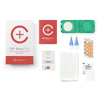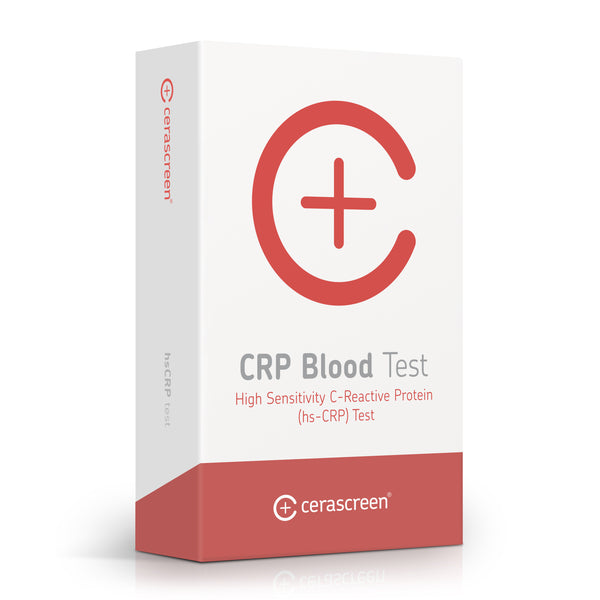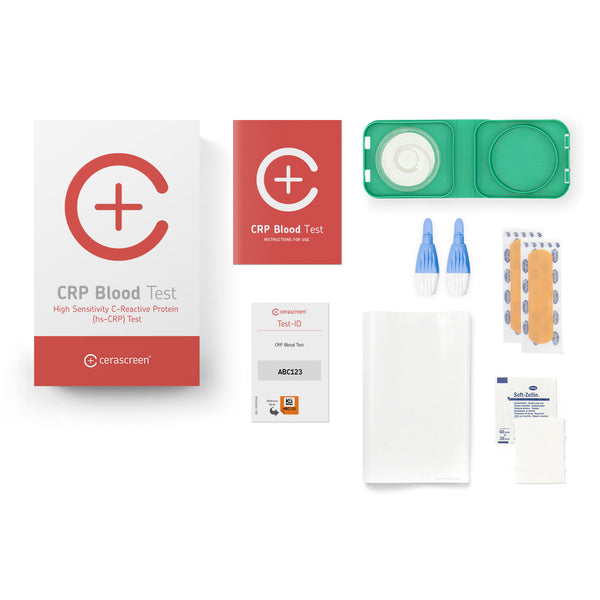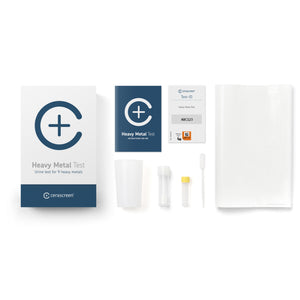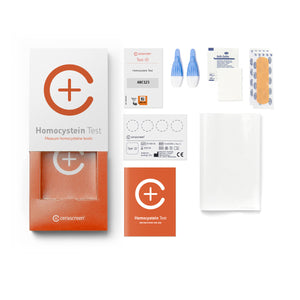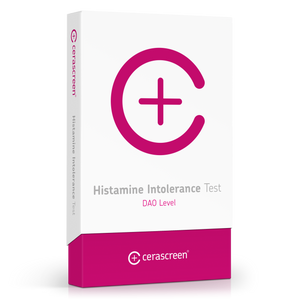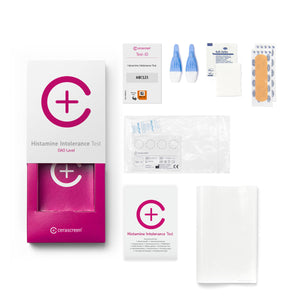product_id = 6670100168763variant_id = 39680353534011template_name =
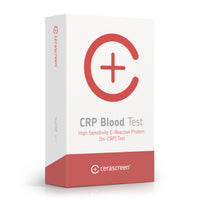
CRP Blood Test
About the test
With the cerascreen® hsCRP Blood Test you can determine the level of inflammation in your blood by measuring the concentration of highly sensitive C-reactive protein in your blood. High inflammation can be an indication of whether there is an increased risk of you developing arteriosclerosis or cardiovascular disease.
If you are potentially at greater risk of developing these cardiovascular issues, you can take targeted countermeasures by adopting a healthy lifestyle and having yourself examined by a doctor at an early stage.
CRP Blood Test
- Take your sample at home – conveniently and discreetly
- Receive a state-of-the-art laboratory analysis
- Benefit from specific recommendations to prevent heart disease
- Receive your result within 5 to 7 working days after sample’s arrival in the laboratory
Note: The cerascreen® CRP Blood Test does not replace medical advice or diagnosis. Please talk to your doctor if you receive abnormal results and before taking any medical action.
Benefits of the CRP Blood Test
Noticeable inflammation levels in your body can give you an initial indication of health problems. The protein hsCRP is used in medicine to better assess the risk and progression of arteriosclerosis and cardiovascular disease.
For the cerascreen® CRP Blood Test, you do not have to visit a doctor’s surgery and do not have to put up with waiting times. You can take the sample comfortably and discreetly at home. The analysis is then carried out in our specialised medical laboratory.
Benefit from our expertise: cerascreen® is the market leader for medical send-in test kits in Europe, with eight years of experience in test development and analysis. We have developed more than 50 approved send-in test kits (medical devices), analysed 250,000 samples and serve 19 countries in Europe and now also the United States!

Result of the CRP Blood Test
As soon as your sample has been analysed, you will receive your results report via the My cerascreen® app or your user account on our website. You can easily view the report on your smartphone, tablet or computer and print it out, if required.
The laboratory analysis will tell you the concentration of hsCRP in your blood. With our recommendations for action, find out when or if you should make an appointment to see your doctor and how you can prevent cardiovascular disease yourself. The comprehensive health information we give you explains how inflammation plays a role in the development of arteriosclerosis and how you can reduce this inflammation through your lifestyle.
Frequently asked questions about CRP Blood Test
Why should I test my hsCRP value?
Cardiovascular diseases are among the most common causes of death in the Western world – above all heart attacks and strokes. However, these diseases do not usually develop overnight. They are often preceded by inflammation in the body, which, in turn, leads to arteriosclerosis – when your blood vessels harden.
Lifestyle plays an important role in your cardiovascular health. Factors such as obesity, smoking and alcohol consumption damage the health of your vessels in the long run. But your genes also play a key role in your risk of developing heart diseases – meaning that risk levels are different for each individual.
How exactly cardiovascular diseases develop is therefore complex, and no two people are alike. This is why it’s recommended to get an idea of your personal risk by measuring your hsCRP value. This inflammation value is considered an early warning sign for arteriosclerosis – and might be the push you need to make some vital lifestyle changes or to make an appointment with a doctor.
Please talk to your doctor about any abnormal results.
Who should take the CRP Blood Test?
The cerascreen® CRP Blood Test is useful for anyone who wants to find out more about their own cardiovascular health.
For example, the test is also fascinating for people with a family history of cardiovascular disease. If there is a family history, you may be at greater risk of developing cardiovascular issues.
If you can personally tick off other risk factors for arteriosclerosis and cardiovascular disease, such as obesity, lack of exercise, high blood pressure or poor cholesterol levels, you would benefit from taking this test. People who smoke or drink a lot of alcohol are also at greater risk of bad cardiovascular health.
Last but not least, the hsCRP levels are insightful for people who already have cardiovascular diseases – it allows you to monitor your heart health. Doctors also measure your hsCRP levels for this purpose; they use it to decide which treatment you might need next.
How does the CRP Blood Test work?
To carry out the CRP Blood Test, take a small blood sample from your fingertip with one of the lancets provided in the test kit. Extract a few drops of blood and collect them on the dried blood spot card – this way, you only have to take a very small amount of blood, and the sample can be stored for a long time.
Send your sample free of charge to our specialised medical laboratory in the return envelope. The laboratory analyses how high the concentration of C-reactive protein (CRP) is in your blood. Since this lab procedure can also detect smaller deviations of the protein, it is also called high-sensitivity CRP (hsCRP).
After the lab analysis, you will receive a notification, after which you’ll be able to access your results report by logging in on our website or on the My cerascreen® app.
How long does the analysis take in the laboratory?
Once your sample has arrived at the laboratory, it will be analyzed there by specialists. How long the analysis takes depends on the exact measuring method and the processes in the laboratory.
If the sample is sent on the correct days (Sunday to Tuesday), this makes it easier for the laboratory to adhere to the times.
For the CRP Blood Test, the laboratory analysis is usually completed within 7 working days after the sample is received in the laboratory.
When should I take the sample?
Measuring your hsCRP level, which is supposed to give an assessment of your cardiovascular risk, only makes sense if you are healthy at the time of taking the sample. This is because many illnesses, such as the flu, colds and other infectious diseases, increase your CRP level and would thus falsify the results.
What will the results tell me?
The results report of our CRP Blood Test tells you the concentration of the highly sensitive C-reactive protein (hsCRP).
You will find out in which reference range your test result is. The hsCRP in this test is measured in milligrammes per decilitre of blood (mg/dl).
< 3 mg/dl: low risk of cardiovascular disease
> 3 mg/dl: increased risk of cardiovascular disease
The result is not in itself a definite diagnosis of disease. However, you can use it to make lifestyle changes or make an appointment to visit your doctor, if necessary.
Which recommendations will I receive?
If your hsCRP levels are in the higher range, we recommend that you contact your doctor for possible further diagnoses – especially, if you are experiencing particular symptoms at the same time.
We also give you a number of dietary and lifestyle recommendations that can help you reduce your risk of cardiovascular disease. For example, studies* have shown that exercise and physical activity can improve hsCRP levels, and therefore probably reduce the risk of developing cardiovascular problems.
* Source: Swardfager, W., Herrmann, N., Cornish, S., Mazereeuw, G., Marzolini, S., Sham, L., Lanctôt, K. L., ‘Exercise intervention and inflammatory markers in coronary artery disease:
A meta-analysis’, American Heart Journal,
vol. 163(4), 2012, pp. 666–676.e3
What is the hsCRP level?
C-reactive proteins (CRP) are certain proteins that are produced in the liver. They play a role in our immune system and mainly protect our cell walls from damage caused by injuries and diseases.
If you suffer from an inflammatory disease, the concentration of CRP in your blood increases. Injuries and operations also lead to higher CRP levels. That is why CRP is a measurement that doctors use to examine infectious diseases such as appendicitis, pneumonia or pancreatitis, but also rheumatic diseases and the inflammatory bowel disease Crohn’s disease, among others.
Highly sensitive CRP (hsCRP), on the other hand, makes it possible to detect even small changes in the concentration of the protein. The results of this more sensitive measurement have been linked in studies primarily to cardiovascular disease. High levels of this protein were found in people who had poor cardiovascular health or who suffered from type 2 diabetes, for example. The hsCRP value is also measured in people who have already had illnesses such as a heart attack or stroke – it allows such people to monitor their health closely.
For which diseases is hsCRP higher than normal?
hsCRP levels are not only high when it comes to cardiovascular diseases arteriosclerosis. Infectious diseases – from a simple cold to severe pneumonia – can also strongly influence the value.
In addition, hsCRP can be high if you have the following chronic disease:
- rheumatic diseases
- obesity (high body mass index)
- metabolic syndrome
- type 2 diabetes
What can I do to reduce my hsCRP level?
You should have high inflammation levels examined by a doctor to clarify possible diseases that could be behind the inflammation.
You can also help to reduce your cardiovascular risk yourself. This includes, above all, lifestyle changes such as a healthy diet with plenty of fruit and vegetables, weight loss if you are overweight, less mental stress and giving up cigarettes and excessive alcohol consumption.
Who should NOT take the CRP Blood Test?
The CRP Blood Test is not or only partially suitable for certain groups of people:
- People with infectious diseases, like hepatitis and HIV, may not use the CRP Blood Test.
- People with haemophilia should not take the test.
- Pregnant and breastfeeding women should only take the CRP Blood Test under medical supervision. The given reference ranges and recommendations do not apply to people in this group; consult your medical professional for advice concerning your test results.
- The CRP Blood Test is not intended for children under 18 years of age.
The test is not intended for diagnosing illnesses or disease. For example, if you suffer from moderate pain, pressure in your chest, or you regularly struggle for breath, consult a doctor.
Why are children under 18 not allowed to take the test?
Our tests are not suitable for underage children and adolescents under the age of 18. Under 18s cannot activate the tests online and therefore cannot receive a test result. We ask that you do not administer the tests to your children either.
Children and adolescents need much closer supervision and counselling regarding medical tests and their interpretation. Testing with lancets and chemicals is not without risk and would need to be closely supervised by guardians. In addition, the reference values we give are always based on adult data. In the case of children, the risk of misinterpreting the results would be very high.
We want to fulfil our responsibility as a provider of medical products and ensure that children and adolescents are not unsettled by measurement results that are difficult for them to interpret. Since we cannot control whether the minors' legal guardians actually consent to the test being carried out and supervise them, we exclude tests for under 18s altogether.
If you are under 18 and have purchased a test, please contact our customer support.
Why does it take up to a week for the sample to reach the lab?
Please bear in mind that your results will not be analyzed in the UK but in Germany. For that reason, it can take up to a week for the sample to arrive at the lab. This does not affect the stability of the samples, as the method we are using is optimized for long transports.
Initially, your sample is sent to our collection center in the UK. From there, it is shipped to our central sample sorting facility in Germany, which then distributes samples to our partner laboratories. Once your sample is analyzed there, you will receive a notification and can access your result online.
Please check your mailbox regularly. We will notify you as soon as your sample is sent, arrives, or is analyzed.
This is how it works
1. Test at home
Your test kit contains everything you need to draw a small sample of blood from your fingertip. Then send the sample back to us free of charge in the enclosed return envelope.
2. View results online
After the evaluation in the medical specialist laboratory, you will have online access to your personal result report.
3. Act
Your access to the test results and the evidence-based findings and tips to improve your health: the my cerascreen® user profile on our website or our app.



